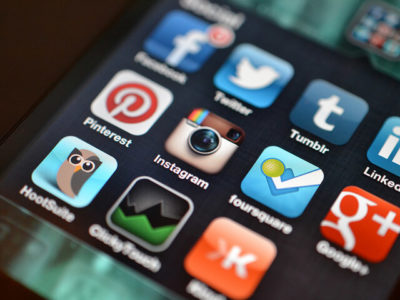When you hear the phrase “social media,” there’s a 99 percent chance you’ll see at least one annoyed glance from someone around you. From the cantankerous elderly to pretentious college sophomores, people always paint social media as the invention that will inevitably destroy us. Facebook is deemed the site that sucks away time better spent reading Hemingway, and people fear doctors will be too busy debating on the Rise or the Kelvin filter for their Instagram #TBT pictures to cure cancer.
There have been countless essay pieces written about how social media will either bring us to a new plane of enlightenment or leave us behind, burning into a pile of societal ash. There are plenty of reasons why I could argue that social media benefits the world: It makes it easier for important news to spread, it efficiently makes us aware of social justice movements and—most importantly—how else would we know about the latest Taylor Swift-Nicki Minaj feud if it weren’t for the trending topics on Twitter?
When it comes down to it, the reason I’ve always loved social media is simple; it has helped me deepen my friendships. Sure, being Facebook friends doesn’t guarantee you hang out every day or text constantly. However, thanks to Facebook, I’ve made friends I never would’ve uttered ‘Hello’ to, and I’ve stayed in touch with friends who easily could’ve turned into distant memories.
My two favorite advertisements ever created are both powerful indicators of the emotional potential of modern technology. Take the Apple Christmas ad “Misunderstood” for example. The ad shows a child who seems to be utterly unengaged from the Christmas festivities and staring at his phone the entire time. The end of the ad reveals that he has been recording everything and has created a beautiful video tribute to his family (Bet ya didn’t see that coming). The other ad is for Facebook. It’s a photo showing a girl laughing and watching someone outside the frame. The caption reads, “That friend who got you, probably still gets you.” Cynics will immediately recognize Apple and Facebook’s appeals to pathos as manipulative and misleading, but these ads show that technology like this holds promise for a legitimate reason.
Too often social media is made to stand for some terrible loss of meaning or some new age of vapidity and narcissism. Albert Einstein is regularly misquoted as saying, “I fear the day that technology will surpass our human interaction. The world will have a generation of idiots.” This fabricated quote was probably invented by someone aiming to abolish Twitter and expose selfies as the ultimate symbol for societal decay.
So maybe it’s selfish of me to enjoy Facebook for doing exactly what people criticize it for: making me feel great with just a simple “like” from an old eighth grade friend. But I’m happy that I have a platform to gloat about my writing and good news. Besides, I like seeing what’s going on in all of my friend’s lives as well, so it’s not completely selfish…is it?
Whenever I go on Snapchat and see a story from my old friend Polly, I watch it and hear her infectious laugh for a few seconds. In those seconds I feel like I’m back in French class, sitting in front of the dorky girl, who was one of the happiest, most honest and unabashed people I’ve ever met.When I see six second clips of voices from my past, I feel this overwhelming nostalgia and force that makes me miss old times, but also encourages me to reconnect with the people I’ve always loved.
Maybe there’s a downside to that semblance of connection or a complacency that develops when you become content with only commenting “cute” under your friend’s selfies instead of actually sitting down for a real conversation. But in the end, it’s comforting to know that whatever happens, all of the people you’ve met in your life are still out there. They may be living their own lives, but maybe once in a while they’re thinking about you, too.



















